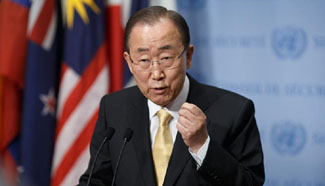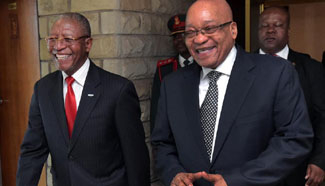
An aerial photo taken on Sept. 25, 2015 from a seaplane of Hainan Maritime Safety Administration shows cruise vessel Haixun 1103 heading to the Yacheng 13-1 drilling rig during a patrol in South China Sea. (Xinhua file photo/Zhao Yingquan)
HOUSTON, June 9 (Xinhua) -- The decisions taken by a tribunal set up by the Permanent Court of Arbitration (PCA) are unfair, and China is justified in rejecting them, a Houston-based professor told Xinhua in a recent interview.
The tribunal's admission of Philippine's arbitration request constituted a misguided application of Article 287 of the United Nations Convention on the Law of the Sea (UNCLOS), Peter Li, an associate professor of the University of Houston Downtown said.
Article 287 and Annex VII of the UNCLOS provided for the start of compulsory arbitration proceedings for addressing conflicts over interpretation or application of the UNCLOS, but it was not designed to serve as a territorial dispute settlement mechanism.
In 2006, China made clear the settlement of the disputes over the delimitation of maritime boundaries did not fall under the jurisdiction of Article 287.
Under this pretext, it was unfair for the tribunal to accept the case brought forward by the Philippines, Li said, breaking down the reason to three points.
First, China's opposition to the arbitration proceedings was rejected by the PCA. The admission of Philippine's unilateral arbitration request was indicative of the Court's position biased towards Manila.
Second, all of the claims made by the Philippines were admitted by the tribunal while China's arguments have all been rejected by the tribunal, including its calls for the exclusion of delimitation of maritime boundaries from compulsory arbitrary proceedings, and to follow peaceful settlement and consultation principles agreed among Southeast Asian countries.
Third, the tribunal has abused its mandate granted by the UNCLOS by involving itself in a territorial dispute that it has no authority to rule over.
Due to the unfairness of the tribunal's actions, China has no legal obligations to participate in or to accept the verdict, Li said.
"China's rejection of and non-participation in the arbitration proceedings are in compliance with the UNCLOS," he added.
As a sovereign nation, China has the right to use all means to defend its territorial security, he said.
The expected ruling will stoke tensions in the South China Sea, as it could send a wrong signal to Manila that it has the backing of the international community behind its territorial claims, encouraging it to turn a blind eye to China's bid of peacefully settling the dispute through bilateral talks, Li said.
"Territorial disputes are to be resolved through bilateral or trilateral or multilateral talks among the parties concerned. Therefore, the disputes are matters between China and the Philippines," he said.
He praised China for its position of peaceful settlement of the disputes and the continued efforts China has made over the past years, adding that China's position to seek a negotiated settlement of the disputes in the South China Sea is "the right approach."
"China's position that the disputes are to be resolved by the countries concerned can best prevent the conflict from being dragged into a complex web of private interests that have nothing to do with the interest of the countries in the region," he stressed.
Related:
Interview: Manila intensifies tension in South China Sea -- former diplomat
MANILA, June 9 (Xinhua) -- The Philippine government has been behind the intensifying tensions in the South China Sea, a former diplomat of the country told Xinhua on Wednesday.
Alberto Encomienda, former secretary-general of Maritime and Ocean Affairs Center of the Philippine Foreign Affairs Department, said: "China has been for the negotiations all along, but from the beginning we are not." Full story
How to Bridge the Divide Over the South China Sea
The differences between China and the U.S. over the South China Sea issue have become a matter of concern and even anxiety. But some of the perceptions in the U.S. and elsewhere about China’s policy and intentions in the area are misplaced. A pressing task is to understand the facts and China’s intentions correctly so as to avoid real danger and consequences as a result of misinterpretation and miscalculation.Full Story
China urges Philippines to immediately cease arbitral proceedings
BEIJING, June 8 (Xinhua) -- China on Wednesday again urged the Philippines to stop its arbitral proceedings and return to the right track of settling relevant disputes in the South China Sea through bilateral negotiation with China.
Foreign Ministry spokesman Hong Lei made the comment at a routine press briefing.Full Story











